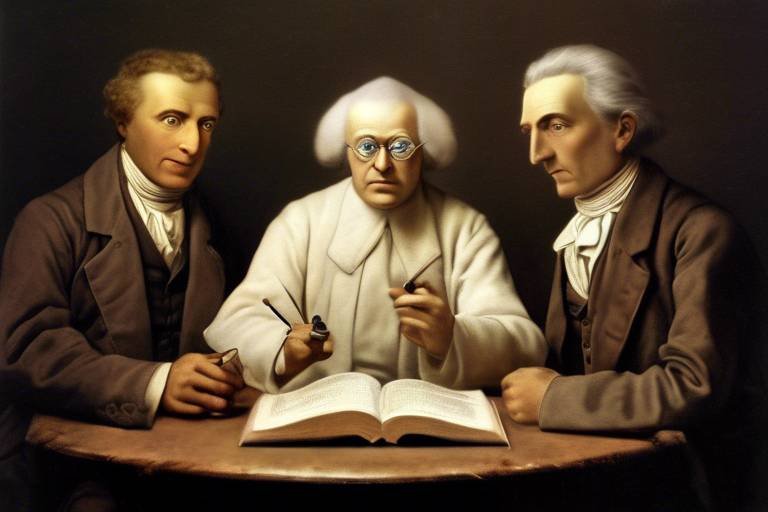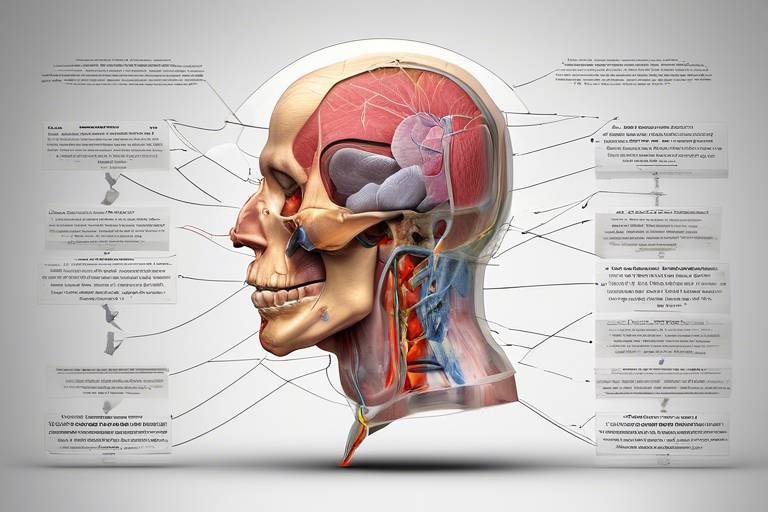Philosophy and Science - A Historic Perspective
The intricate dance between philosophy and science has captivated thinkers for centuries. It's a relationship that has evolved dramatically, shaping our understanding of the universe and our place within it. Imagine a time when the boundaries between what we now categorize as science and philosophy were blurred, where questions about existence, the nature of reality, and the laws of nature were explored under the same intellectual umbrella. This article embarks on a journey through history, examining how these two fields have influenced and challenged one another, leading to the profound advancements we enjoy today.
From the ancient civilizations of Egypt and Mesopotamia, where early astronomers looked to the stars and began to formulate theories about celestial bodies, to the philosophical musings of the Greeks, the roots of scientific thought can be traced back to these early inquiries. Thinkers like Thales and Anaximander began to seek natural explanations for phenomena that were once attributed to the whims of the gods. They laid the groundwork for what would eventually blossom into the scientific method—a systematic approach to inquiry that relies on observation, experimentation, and reasoning.
As we delve deeper into history, we encounter the likes of Aristotle, whose contributions to both philosophy and science were monumental. He didn't just observe nature; he sought to understand its underlying principles. His works on biology, physics, and metaphysics created a framework that would dominate Western thought for centuries. Aristotle's belief in empirical observation as a means of acquiring knowledge paved the way for future scientists to adopt similar methodologies. Yet, while Aristotle emphasized observation, other philosophers like Descartes introduced rationalism, arguing that reason is the primary source of knowledge. This tension between observation and reasoning would fuel debates that persist to this day.
To better understand this relationship, we can look at a simple table that highlights key philosophical movements and their contributions to scientific thought:
| Philosopher | Key Contribution | Impact on Science |
|---|---|---|
| Aristotle | Empirical observation | Established foundational principles in biology and physics |
| Descartes | Rationalism | Emphasized reason, influencing mathematical and scientific methods |
| Kant | Critique of Pure Reason | Explored the limits of human understanding and the nature of knowledge |
This historical perspective reveals not only the evolution of thought but also the dynamic interplay between these disciplines. As we progress into the Enlightenment and the Scientific Revolution, we witness a pivotal shift. The Enlightenment, with its emphasis on reason and empirical investigation, marked a turning point where philosophy and science began to diverge yet remain interconnected. Thinkers like Newton and Locke championed a new era of inquiry, where scientific methods began to take precedence, leading to groundbreaking discoveries that challenged existing paradigms.
In conclusion, the historical relationship between philosophy and science is a rich tapestry woven with threads of inquiry, reason, and discovery. As we continue to explore this fascinating interplay, we recognize that the questions posed by philosophers often guide the inquiries of scientists, and vice versa. This enduring relationship not only shapes our understanding of the natural world but also propels us toward new frontiers of knowledge and discovery.
- How did philosophy influence the development of science? Philosophy provided the foundational principles of reasoning and inquiry that shaped scientific methods.
- What is the difference between rationalism and empiricism? Rationalism emphasizes reason as the primary source of knowledge, while empiricism relies on sensory experience and observation.
- Who are some key figures in the history of philosophy and science? Important figures include Aristotle, Descartes, and Kant, each contributing significantly to the evolution of thought in these fields.

The Origins of Scientific Thought
The journey of scientific thought is as fascinating as it is complex, originating from the **curious minds** of ancient civilizations who dared to ask the big questions about the world around them. In a time when myths and superstitions dominated explanations of natural phenomena, early philosophers began to seek answers grounded in observation and reason. This shift marked a significant turning point in human history, paving the way for what we now recognize as the scientific method.
In ancient Mesopotamia, for instance, scholars meticulously recorded astronomical observations, laying the groundwork for future scientific endeavors. The Babylonians were not just stargazers; they were early astronomers who developed a sophisticated understanding of celestial bodies. They created detailed star catalogs and even predicted lunar eclipses, showcasing a blend of observation and mathematical reasoning that was revolutionary for their time.
Meanwhile, in ancient Egypt, the study of medicine and anatomy began to take shape, with practitioners like Imhotep pioneering surgical techniques and medical practices based on empirical observation. The Egyptians understood the human body in ways that were astonishing for their era, often blending their findings with spiritual beliefs. This combination of observation and interpretation was critical in shaping early scientific thought, demonstrating that **science** was not solely about numbers and formulas but also about understanding the intricacies of life.
As we move towards ancient Greece, the philosophical inquiries became even more pronounced. Thinkers such as **Thales**, **Anaximander**, and **Pythagoras** began to explore the fundamental principles of nature. Thales, often considered the first philosopher, proposed that water was the essence of all things, suggesting a single underlying substance for the universe. This idea was revolutionary, as it encouraged others to seek natural explanations rather than relying solely on mythological narratives.
The Greeks further advanced scientific thought through the establishment of **rational inquiry**. The likes of **Aristotle** not only contributed to various scientific disciplines but also emphasized the importance of systematic observation. His works laid the foundation for biology, physics, and ethics, intertwining philosophical thought with empirical study. Aristotle’s approach to categorizing living organisms based on their characteristics exemplified a method that would influence scientific classification for centuries.
To summarize, the origins of scientific thought were deeply rooted in the philosophical inquiries of ancient civilizations. These early thinkers ventured beyond the confines of myth and superstition, establishing a framework for observation and reasoning that would evolve into modern science. The interplay between **philosophy and empirical evidence** was not merely a historical curiosity; it was the cornerstone of all subsequent scientific advancements. As we delve deeper into this relationship, we can appreciate how these ancient ideas continue to resonate in today’s scientific pursuits.
- What is the significance of ancient civilizations in the development of scientific thought?
Ancient civilizations, through their early observations and philosophical inquiries, laid the groundwork for systematic scientific exploration and the eventual establishment of the scientific method. - How did Greek philosophers contribute to science?
Greek philosophers like Thales and Aristotle emphasized observation and rational inquiry, which helped shape various scientific disciplines and methodologies. - What role did empirical evidence play in the origins of science?
Empirical evidence was crucial as it encouraged thinkers to seek natural explanations for phenomena, moving away from mythological interpretations.

Key Philosophers and Their Impact
The history of philosophy is rich with thinkers who have profoundly influenced the trajectory of science. From the ancient Greeks to modern-day philosophers, their ideas have shaped our understanding of the natural world and the methods we use to explore it. One of the most significant figures in this narrative is Aristotle, whose empirical observations laid the groundwork for biological sciences. He emphasized systematic observation and categorization, urging scholars to study the world through careful analysis rather than relying solely on speculation. Aristotle's approach was revolutionary; he introduced a framework for scientific inquiry that would dominate Western thought for centuries.
Following Aristotle, we encounter the likes of René Descartes, who famously proclaimed, "I think, therefore I am." Descartes championed the idea of rationalism, asserting that reason is the primary source of knowledge. His work in mathematics and philosophy established a new standard for scientific methodology, advocating for a systematic approach to problem-solving that combined logic with empirical evidence. Descartes' dualism also sparked debates about the nature of reality and consciousness, influencing not only science but also psychology and philosophy.
Then we have Immanuel Kant, who bridged the gap between rationalism and empiricism. Kant argued that while our knowledge begins with experience, it is also shaped by our innate cognitive structures. His ideas about the categorical imperative and the nature of scientific inquiry pushed philosophers to consider the ethical implications of their findings. Kant's influence is evident in the way modern science grapples with moral questions, particularly in fields like genetics and artificial intelligence.
To understand the impact of these philosophers, it's essential to consider their contributions as part of a broader dialogue. The interplay between empiricism and rationalism created a fertile ground for scientific advancement. While rationalists like Descartes emphasized the importance of reason, empiricists such as John Locke and David Hume argued that all knowledge is derived from sensory experience. This tension has shaped scientific inquiry, leading to debates about the validity of knowledge and the methods used to acquire it.
As we delve deeper into these philosophical movements, we find that they have laid the foundation for contemporary scientific practices. The table below summarizes the contributions of key philosophers and their lasting impacts:
| Philosopher | Key Contributions | Impact on Science |
|---|---|---|
| Aristotle | Empirical observation, classification of living organisms | Foundation of biological sciences |
| René Descartes | Rationalism, Cartesian coordinate system | Established modern scientific methodology |
| Immanuel Kant | Categorical imperative, synthesis of rationalism and empiricism | Influenced ethical considerations in scientific research |
| John Locke | Empiricism, tabula rasa (blank slate) | Emphasized the importance of sensory experience |
| David Hume | Skepticism, problem of induction | Challenged the assumptions of scientific reasoning |
These philosophers not only shaped the methodologies of their time but also sparked discussions that continue to resonate today. Their ideas have led to a deeper understanding of the scientific method, encouraging a rigorous examination of evidence and a commitment to ethical standards in research. As we explore the relationship between philosophy and science, it's clear that the legacy of these thinkers remains vital in guiding contemporary scientific inquiry.
- What is the relationship between philosophy and science? Philosophy provides the foundational principles and ethical considerations that guide scientific inquiry, while science offers empirical evidence that can validate or challenge philosophical theories.
- How did Aristotle influence modern science? Aristotle's emphasis on observation and classification laid the groundwork for biological sciences, encouraging a systematic approach to studying the natural world.
- What role does ethics play in scientific research? Ethics in scientific research ensures that studies are conducted responsibly, considering the implications of findings on society and the environment.

The Role of Rationalism
Rationalism, at its core, champions the idea that reason is the primary source of knowledge. This philosophical stance has played a pivotal role in shaping the foundations of scientific thought. Think about it: when we approach a problem, we often rely on logic and structured reasoning to arrive at conclusions. Rationalists argue that this method of inquiry is not just effective but essential for understanding the world around us. The likes of René Descartes, often hailed as the father of modern philosophy, emphasized that knowledge could be attained through deductive reasoning. His famous dictum, "I think, therefore I am," encapsulates the essence of rationalist thought, suggesting that the very act of thinking is proof of one's existence and a starting point for acquiring further knowledge.
Moreover, rationalism has been instrumental in the development of scientific methodologies. The scientific method itself, which relies heavily on hypothesis formulation and logical deduction, is a testament to rationalist ideals. For instance, when scientists propose theories, they are engaging in a rationalist approach by using reason to predict outcomes based on their understanding of existing laws of nature. This interplay between rational thought and scientific inquiry is what allows us to make sense of complex phenomena, from the movement of planets to the behavior of subatomic particles.
However, the relationship between rationalism and science is not without its complexities. While rationalism advocates for the use of reason, it must coexist with empirical evidence to create a robust framework for understanding. This duality is where the tension between empiricism and rationalism emerges. Empiricism emphasizes knowledge gained through sensory experience, while rationalism leans towards knowledge derived from intellectual reasoning. It's like trying to bake a cake: you need both the recipe (rationalism) and the ingredients (empiricism) to create a delicious result. This ongoing dialogue between the two philosophies has enriched scientific inquiry, allowing for a more comprehensive exploration of reality.
In the realm of modern science, rationalism continues to influence various disciplines. For example, in mathematics, theorems are proven through logical deduction, reflecting the rationalist belief in reason as the path to knowledge. In the natural sciences, theories are formulated based on rational predictions, which are then tested against empirical data. This synergy between rationalist thought and empirical investigation has propelled scientific advancements, enabling humanity to unlock the secrets of the universe.
As we look to the future, the role of rationalism in science remains crucial. With the advent of new technologies and interdisciplinary approaches, the need for a rational framework to interpret and analyze data is more important than ever. Rationalism encourages scientists to think critically, question assumptions, and seek deeper understanding, ensuring that the pursuit of knowledge remains a dynamic and evolving journey.
- What is rationalism? Rationalism is a philosophical approach that emphasizes reason as the primary source of knowledge, contrasting with empiricism, which focuses on sensory experience.
- How does rationalism influence science? Rationalism shapes scientific methodologies by promoting the use of logical reasoning to formulate hypotheses and theories, which are then tested through empirical observation.
- Who are some key figures in rationalism? Notable rationalists include René Descartes, Baruch Spinoza, and Gottfried Wilhelm Leibniz, all of whom contributed significantly to the development of modern philosophical thought.
- Is rationalism still relevant today? Yes, rationalism remains relevant as it continues to inform scientific inquiry, critical thinking, and the interpretation of complex data in various fields.

Empiricism vs. Rationalism
When we dive into the fascinating world of philosophy, one of the most intriguing debates that arises is the clash between empiricism and rationalism. At first glance, these two schools of thought might seem like they’re just two sides of the same coin, but in reality, they represent fundamentally different approaches to knowledge and understanding. Empiricism champions the idea that knowledge comes primarily from sensory experience—think of it as the belief that seeing is believing. On the other hand, rationalism posits that reason and innate ideas are the primary sources of knowledge, suggesting that some truths are self-evident and can be understood through logic alone.
This philosophical tug-of-war has shaped scientific inquiry for centuries. Empiricists argue that we should rely on observable data and experiments to draw conclusions about the world. They would say, "Why trust abstract reasoning when we can test it in real life?" This approach has led to groundbreaking discoveries in fields like physics and biology, where experimentation and observation are crucial. For instance, consider how the scientific method relies heavily on empirical evidence to validate hypotheses. Without this grounding in reality, many scientific advancements would simply not exist.
Conversely, rationalists would argue that there are certain truths that we can understand without needing to observe them directly. Take mathematics, for example; we can deduce that 2 + 2 4 through reason alone, without needing to count physical objects. This perspective emphasizes the importance of theoretical frameworks in science, which can guide our understanding even in the absence of direct empirical evidence. Think of it as having a map before you embark on a journey; it helps you navigate even if you haven't traveled the path before.
The tension between these two philosophies can lead to some heated debates. For example, consider the following points of contention:
- Source of Knowledge: Is knowledge derived from experience or from reason?
- Role of Observation: How important is observation in forming scientific theories?
- Validity of Theories: Can a theory be valid if it cannot be empirically tested?
In many ways, the relationship between empiricism and rationalism can be likened to a dance. They each have their strengths and weaknesses, and at different times in history, one has taken the lead over the other. For instance, during the Scientific Revolution, empiricism took the forefront as scientists like Galileo and Newton emphasized observation and experimentation. However, as science evolved, rationalist ideas also found their place, particularly in fields like mathematics and theoretical physics.
Ultimately, the ongoing dialogue between empiricism and rationalism enriches our understanding of the world. It encourages scientists and philosophers alike to question their assumptions and explore new avenues of thought. As we continue to push the boundaries of knowledge, the interplay between these two philosophies will undoubtedly play a crucial role in shaping the future of scientific inquiry.
- What is empiricism? Empiricism is the philosophical belief that knowledge comes primarily from sensory experience and observation.
- What is rationalism? Rationalism posits that reason and innate ideas are the primary sources of knowledge, emphasizing logic and deduction.
- How do empiricism and rationalism differ? The key difference lies in their source of knowledge: empiricism relies on experience, while rationalism relies on reason.
- Can both philosophies coexist in scientific inquiry? Yes, many scientific fields utilize both empirical evidence and rationalist theories to enhance understanding.

Philosophy of Science
The is a fascinating field that delves into the fundamental questions about the nature and scope of scientific inquiry. It intertwines with various philosophical ideas, shaping how we understand the world around us. At its core, this discipline seeks to clarify what science is, how it operates, and what it means for something to be considered 'scientific.' This exploration is crucial, as it influences not just the scientific community but also the broader public's perception of science.
One of the central concepts in the philosophy of science is scientific realism. This idea posits that the world described by science is real and that scientific theories aim to provide truthful descriptions of the universe. Realists argue that successful scientific theories should correspond to actual entities and processes in the world, suggesting that our scientific knowledge is a reflection of reality itself. In contrast, the anti-realist perspective contends that theories are merely useful instruments for predicting phenomena, without necessarily revealing deeper truths about the world.
Another critical concept is falsifiability, introduced by philosopher Karl Popper. Falsifiability is the principle that for a theory to be considered scientific, it must be testable and, importantly, able to be proven false. This criterion helps distinguish scientific claims from non-scientific ones, such as those found in metaphysics or pseudoscience. Popper's emphasis on falsifiability has profoundly influenced how scientists formulate hypotheses and conduct experiments, ensuring that scientific inquiry remains rigorous and self-correcting.
Moreover, the demarcation problem addresses the challenge of distinguishing between science and non-science. This issue is significant because it impacts how we allocate resources, trust scientific claims, and engage with various disciplines. The demarcation problem raises questions about the criteria we use to evaluate scientific theories and whether those criteria can evolve as our understanding of science itself grows.
To illustrate these concepts further, let's examine a simple table that summarizes the key philosophical positions in the philosophy of science:
| Concept | Description |
|---|---|
| Scientific Realism | The belief that scientific theories accurately describe the world. |
| Anti-Realism | The view that theories are merely useful tools for prediction. |
| Falsifiability | The principle that a theory must be testable and refutable. |
| Demarcation Problem | The challenge of distinguishing scientific from non-scientific claims. |
In addition to these foundational concepts, the philosophy of science also encompasses various methodologies and approaches. For instance, induction and deduction are two contrasting methods of reasoning that scientists use to develop theories and draw conclusions. Inductive reasoning involves drawing general conclusions from specific observations, while deductive reasoning starts with general principles to reach specific conclusions. Both methods play vital roles in how scientific knowledge is constructed and validated.
As we navigate through the complexities of the philosophy of science, it becomes evident that these discussions are not merely academic. They have profound implications for how we approach scientific literacy, education, and public policy. Understanding the philosophical underpinnings of science enables us to critically evaluate scientific claims, appreciate the limitations of scientific inquiry, and engage in informed discussions about the role of science in society.
- What is the philosophy of science? - It is the study of the assumptions, foundations, and implications of science, exploring what constitutes scientific knowledge.
- Why is falsifiability important? - Falsifiability helps distinguish scientific claims from non-scientific ones, ensuring that theories can be tested and potentially disproven.
- How does scientific realism differ from anti-realism? - Scientific realism asserts that scientific theories accurately represent reality, while anti-realism suggests that theories are merely useful tools for predictions.

The Enlightenment and Scientific Revolution
The Enlightenment was a remarkable period in history, often referred to as the Age of Reason, where the foundations of modern philosophy and science were laid. It spanned the 17th and 18th centuries, a time when thinkers began to challenge traditional beliefs and sought to understand the world through reason, observation, and empirical evidence. This era was crucial in bridging the gap between philosophical inquiry and scientific exploration, leading to what we now call the Scientific Revolution. Can you imagine a time when questioning the status quo was not just encouraged but celebrated? That's exactly what the Enlightenment represented.
During this transformative period, philosophers like John Locke, David Hume, and Immanuel Kant emerged as key figures. Their ideas not only influenced philosophical discourse but also provided the intellectual fuel for scientific advancements. For instance, Locke's theories on empiricism emphasized that knowledge comes from sensory experience, which directly supported the methods of observation and experimentation that scientists would later adopt. Hume took this a step further by questioning the nature of causality, prompting scientists to consider the limitations of human understanding in the pursuit of knowledge.
The Scientific Revolution itself, which coincided with the Enlightenment, marked a significant shift in how humanity approached the natural world. Think of it as a massive explosion of knowledge and discovery! The likes of Galileo Galilei and Isaac Newton began to challenge the geocentric view of the universe, paving the way for heliocentrism and the laws of motion. Their work exemplified the power of the scientific method, which relies on systematic observation and experimentation. It was during this time that the phrase "I think, therefore I am," attributed to Descartes, became a rallying cry for those seeking to understand not just existence but the very fabric of reality.
One of the most fascinating aspects of the Enlightenment was the way it encouraged interdisciplinary collaboration. Philosophers and scientists began to communicate and share ideas, leading to a fertile ground for innovation. The establishment of societies such as the Royal Society of London in 1660 exemplified this collaboration, bringing together thinkers from various fields to discuss and disseminate new knowledge. This exchange of ideas was crucial for the advancement of fields such as physics, chemistry, and biology, ultimately changing the course of human understanding.
Moreover, the Enlightenment laid the groundwork for modern democratic thought, emphasizing the importance of individual rights and freedoms. This philosophical shift had profound implications not only for science but also for society as a whole. As people began to value reason and evidence over tradition and dogma, the stage was set for revolutionary changes in governance, education, and social structures. The impact was so significant that it can be likened to a ripple effect, where the ideas of the Enlightenment continue to influence contemporary society.
In summary, the Enlightenment and the Scientific Revolution were intertwined movements that reshaped the landscape of human thought. They challenged the old ways of thinking and ushered in a new era characterized by reason, observation, and inquiry. As we reflect on this period, it is essential to recognize how the philosophical frameworks established during this time continue to inform our understanding of science today. It begs the question: how much further can we push the boundaries of knowledge when we embrace the spirit of curiosity that defined the Enlightenment?
- What was the Enlightenment?
The Enlightenment was an intellectual movement in the 17th and 18th centuries that emphasized reason, individualism, and skepticism of traditional authority.
- How did the Scientific Revolution change the world?
The Scientific Revolution introduced the scientific method, leading to significant advancements in various fields such as physics, biology, and chemistry, fundamentally altering our understanding of the natural world.
- Who were some key figures of the Enlightenment?
Notable Enlightenment thinkers include John Locke, Immanuel Kant, and David Hume, who contributed significantly to philosophy and the development of scientific thought.
- What is the relationship between philosophy and science?
Philosophy provides the foundational principles that guide scientific inquiry, while scientific discoveries often lead to new philosophical questions and frameworks.

Modern Philosophical Movements
In the ever-evolving landscape of thought, have emerged as pivotal forces that challenge the traditional paradigms of philosophy and science. These movements not only reshape our understanding of the world but also influence how scientific inquiry is conducted. Let's dive into some of the most significant modern philosophical movements and their impact on the scientific realm.
One of the most prominent movements is postmodernism. This philosophical approach questions the very foundations of knowledge and truth, suggesting that what we consider "truth" is often a construct influenced by cultural and social contexts. In the realm of science, postmodernism encourages a critical examination of scientific narratives, urging scientists to recognize the subjective elements that can influence research outcomes. This skepticism can lead to a richer understanding of scientific phenomena, as it prompts researchers to consider diverse perspectives and methodologies.
Another influential movement is pragmatism, which emphasizes the practical consequences of ideas as the primary basis for their merit. Pragmatism advocates for a collaborative approach in scientific inquiry, suggesting that the value of a theory lies in its applicability and success in solving real-world problems. This philosophy has fostered interdisciplinary research, where scientists from various fields work together to tackle complex issues, such as climate change or public health crises. By focusing on outcomes rather than rigid theories, pragmatism encourages scientists to remain flexible and adaptive in their methodologies.
Critical theory also plays a significant role in contemporary philosophical discourse. Originating from the Frankfurt School, critical theory critiques the societal structures that influence knowledge production and scientific practice. It emphasizes the importance of understanding the social, political, and economic factors that shape scientific research. This perspective is particularly relevant in discussions about ethics in science, as it challenges researchers to consider the broader implications of their work and the potential consequences for marginalized communities. Critical theory invites a more holistic view of science, urging researchers to engage with the ethical dimensions of their inquiries.
These movements highlight the dynamic interplay between philosophy and science in the modern era. They encourage a reexamination of traditional scientific methodologies and invite a more inclusive approach to knowledge production. In doing so, they pave the way for innovative research that not only addresses immediate scientific questions but also considers the ethical and societal implications of scientific advancements.
As we navigate through these philosophical currents, it's essential to recognize that the conversation between philosophy and science is ongoing. Each movement brings forth new questions and challenges, prompting us to continually reflect on the nature of knowledge and the role of science in our lives. By engaging with these modern philosophical movements, we can cultivate a richer understanding of the world and the complex systems that govern it.
- What is postmodernism? Postmodernism is a philosophical movement that questions the existence of absolute truths and emphasizes the subjective nature of knowledge.
- How does pragmatism influence science? Pragmatism focuses on the practical outcomes of ideas, encouraging scientists to adopt flexible methodologies that address real-world problems.
- What is critical theory? Critical theory critiques the societal structures that shape knowledge production, urging researchers to consider the ethical implications of their work.
- Why are modern philosophical movements important? They challenge traditional paradigms and encourage a more inclusive and ethical approach to scientific inquiry.

Ethics in Scientific Research
The realm of scientific research is not just a domain of numbers, experiments, and theories; it's also a landscape where ethical considerations play a crucial role. As we push the boundaries of knowledge, we must also navigate the murky waters of morality. This intersection of ethics and science raises profound questions: What responsibilities do scientists have toward their subjects? How do we ensure that the pursuit of knowledge does not come at the cost of human dignity or environmental integrity? These questions are not merely academic; they are essential to the integrity of scientific inquiry.
Historically, the relationship between ethics and science has been fraught with challenges. From the infamous Tuskegee Syphilis Study, which exploited African American men under the guise of treatment, to the modern-day debates surrounding genetic modification and climate change, the ethical implications of scientific research have often been overlooked in the rush to innovate. As we reflect on these past transgressions, we must recognize the importance of establishing ethical guidelines that prioritize the welfare of individuals and communities.
One of the most significant frameworks for addressing ethical issues in research is the concept of informed consent. This principle asserts that participants in research should be fully aware of the nature of the study, including any potential risks involved. It’s akin to asking someone for permission before borrowing their favorite book; consent is not just a formality, but a fundamental respect for autonomy. Furthermore, ethical research must also consider the justice aspect, ensuring that no group is disproportionately burdened by the risks of research while others reap the benefits.
Moreover, the advent of new technologies has introduced complex ethical dilemmas that require careful consideration. For instance, the use of artificial intelligence in research can lead to significant advancements, but it also raises questions about bias and privacy. Scientists must grapple with the responsibility of ensuring that their algorithms do not perpetuate existing inequalities or compromise the confidentiality of sensitive data. It's a delicate balancing act, much like walking a tightrope—one misstep could lead to disastrous consequences.
To further illustrate the ethical landscape of scientific research, consider the following table that outlines key ethical principles and their implications:
| Ethical Principle | Description | Implications for Research |
|---|---|---|
| Informed Consent | Participants must be fully informed about the study and agree to participate. | Ensures respect for autonomy and protects against exploitation. |
| Beneficence | Researchers must maximize benefits and minimize harm. | Guides researchers to consider the welfare of participants and society. |
| Justice | Fair distribution of research benefits and burdens. | Prevents exploitation of vulnerable populations. |
As we forge ahead into an era marked by rapid scientific advancement, the need for robust ethical frameworks becomes increasingly urgent. Scientists must not only be guided by a thirst for knowledge but also by a commitment to ethical conduct. This dual responsibility will ensure that scientific progress does not come at the expense of our moral obligations to one another and to the planet.
In conclusion, the ethics of scientific research is an ever-evolving field that demands vigilance and introspection. As we continue to explore the boundaries of what is possible, let us remember that with great power comes great responsibility. The future of research hinges on our ability to balance innovation with ethical integrity, fostering a scientific community that values not just what we can do, but what we should do.
- What is informed consent in research? Informed consent is the process of ensuring that participants are fully aware of the study's purpose, procedures, risks, and benefits before agreeing to take part.
- Why is ethics important in scientific research? Ethics is crucial because it protects the rights and welfare of participants, ensures the integrity of the research process, and promotes public trust in scientific findings.
- How do ethical guidelines impact scientific innovation? Ethical guidelines help to ensure that innovations are developed responsibly, balancing the potential benefits with the risks and moral implications involved.

The Future of Philosophy and Science
The relationship between philosophy and science is constantly evolving, much like a river that carves its path through the landscape of human understanding. As we stand on the brink of a new era marked by rapid technological advancements, the interplay between these two fields becomes increasingly significant. With the rise of artificial intelligence, biotechnology, and other cutting-edge innovations, we find ourselves grappling with profound questions that challenge our traditional notions of knowledge, ethics, and existence.
One of the most exciting aspects of this evolution is the potential for interdisciplinary collaboration. Imagine a world where philosophers and scientists work hand in hand, merging the analytical rigor of scientific inquiry with the critical perspectives of philosophical thought. This partnership could lead to breakthroughs not just in technology, but also in our understanding of what it means to be human. For instance, as we delve deeper into the realms of consciousness and artificial intelligence, philosophical questions about identity, morality, and free will become paramount.
As we look to the future, we must also consider the ethical implications of scientific advancements. The rapid pace of innovation often outstrips our ability to fully understand its consequences. Here, philosophy plays a crucial role in guiding our ethical frameworks. Questions like “What responsibilities do scientists have toward society?” and “How should we regulate emerging technologies?” require a philosophical lens to navigate. For example, the development of genetic engineering technologies raises ethical dilemmas regarding designer babies and the potential for eugenics. These discussions are not merely academic; they have real-world implications that can shape policy and societal norms.
Furthermore, the advent of big data and machine learning presents unique challenges and opportunities for both science and philosophy. As we collect vast amounts of data, the question of how to interpret and use this information ethically becomes crucial. Philosophers can provide insights into the implications of data privacy, consent, and the potential biases inherent in algorithms. This is where the concept of data ethics emerges, prompting us to reflect on how we can ensure that technological progress does not come at the expense of fundamental human rights.
To encapsulate the future trajectory of philosophy and science, we can outline several key areas of potential growth:
- Interdisciplinary Research: Collaboration between scientists and philosophers could lead to more holistic approaches to complex problems.
- Ethical Frameworks: Developing robust ethical guidelines for emerging technologies will be essential for responsible innovation.
- Public Engagement: Increasing dialogue between the scientific community and the public can demystify science and foster a more informed citizenry.
- Philosophical Inquiry: New philosophical inquiries will arise as we confront the implications of advancements in AI, biotechnology, and beyond.
In conclusion, the future of philosophy and science is not just about the advancement of knowledge; it is about understanding the implications of that knowledge. As we navigate this uncharted territory, we must remain vigilant and reflective, ensuring that our pursuit of understanding does not lose sight of our ethical responsibilities. The dialogue between philosophy and science will be critical in shaping a future that is not only innovative but also just and humane.
Q: How do philosophy and science influence each other?
A: Philosophy provides the foundational questions and ethical frameworks that guide scientific inquiry, while science offers empirical data that can challenge or support philosophical theories.
Q: What role does ethics play in scientific advancements?
A: Ethics is crucial in guiding the responsible application of scientific discoveries, ensuring that advancements benefit society and do not infringe on individual rights.
Q: Can philosophy help in understanding artificial intelligence?
A: Absolutely! Philosophy helps us explore the implications of AI, including questions about consciousness, free will, and moral responsibility.
Q: What are some future challenges that philosophy and science will face together?
A: Future challenges include addressing the ethical implications of genetic engineering, data privacy, and the societal impact of AI, all of which require philosophical inquiry alongside scientific exploration.
Frequently Asked Questions
- What is the relationship between philosophy and science?
Philosophy and science are deeply intertwined, with philosophy providing the foundational questions and frameworks that guide scientific inquiry. Throughout history, philosophical thought has influenced scientific methodologies and the way we understand the natural world.
- How did ancient civilizations contribute to scientific thought?
Ancient civilizations, such as the Greeks and Egyptians, made significant contributions by emphasizing systematic observation and reasoning. Their philosophical inquiries laid the groundwork for scientific exploration, leading to the development of early scientific methods.
- Who are some key philosophers that shaped modern science?
Influential figures like Aristotle, Descartes, and Kant played critical roles in shaping modern scientific thought. Their ideas about logic, reason, and the nature of knowledge have been pivotal in advancing various scientific disciplines.
- What is the difference between rationalism and empiricism?
Rationalism emphasizes reason as the primary source of knowledge, while empiricism focuses on sensory experience. This tension between the two philosophies has significantly influenced scientific inquiry and debates about how we acquire knowledge.
- What is the philosophy of science?
The philosophy of science examines the fundamental concepts and assumptions underlying scientific practices. It explores ideas such as scientific realism, falsifiability, and the demarcation problem, which help define the boundaries of scientific inquiry.
- How did the Enlightenment impact science?
The Enlightenment fostered a spirit of critical thinking and empirical investigation, leading to significant advancements in scientific thought. This period encouraged individuals to question established beliefs and pursue knowledge through observation and reason.
- What are modern philosophical movements influencing science today?
Contemporary movements such as postmodernism, pragmatism, and critical theory challenge traditional views and expand the scope of inquiry in science. They encourage a more nuanced understanding of knowledge and its implications for scientific practice.
- What ethical considerations arise in scientific research?
Ethical implications in scientific research include discussions about morality, responsibility, and the potential impact of scientific advancements on society. Philosophical frameworks help guide these discussions and inform ethical research practices.
- What is the future of the relationship between philosophy and science?
The future of philosophy and science is likely to involve evolving relationships, especially with emerging technologies and interdisciplinary approaches. New philosophical inquiries will continue to shape our understanding of scientific practices and the ethical considerations they entail.



















